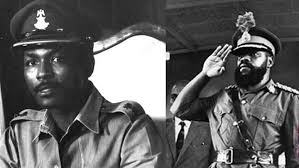What could have possibly been the first military coup in Nigeria was mulled by the late Head of State of defunct Republic of Biafra, Emeka Odumegwu-Ojukwu and the late Col Victor Banjo, former Head of State, Gen Yakubu Gowon, retd, said.
He said the duo had suggested a military putsch as a solution to the crisis between then-President, Dr. Nnamdi Azikiwe and Prime Minister, the late Alhaji Abubakar Tafawa Balewa.
Azikiwe and Balewa were not on the same page following the 1964 federal election crisis.
Azikiwe as the President had asked the Prime Minister to postpone the election on the ground of irregularities in building up to the exercise, but Balewa disagreed.
The boycott of the polls by United Progressive Grand Alliance, UPGA, and other related events was believed to have precipitated what became known as the federal election crisis.
Gowon in an interview Published in Mike Awoyinfa’s Press Clips, said Ojukwu and Banjo had suggested military intervention as a solution to the political crisis in the country.
He said that instead of consenting to it, he cautioned them after which he reported the matter to the head of the army at the time, a British officer.
Gowon said his disagreement with Ojukwu on the matter was the only time there was a misunderstanding between both of them before the Nigerian Civil War.
“I don’t know why people keep referring to the so-called rivalry between me and Ojukwu. There was no question of rivalry between us at all. As young officers in the army, our relationship was exceptionally good. We were very friendly. The only time that anything happened was in 1964 after the election when Zik sacked Balewa and Balewa sacked Zik. That was the time that probably you can say certain developments led me to give a warning, because there was this question of some of the senior military officers between Banjo and Ojukwu, urging the military to intervene on behalf of Zik.
Also Read: 80 dead, 769 new Coronavirus cases reported in China
“Of course, I listened to their presentations and what I thought they meant was that there should be military intervention led by us the senior officers at the time: With David Ejoor as the GSO 1, as the Senior Staff Officer, and then myself as Adjutant General of the Nigerian Army and then Ojukwu as the Quartermaster General and then Banjo as the head of the electrical and mechanical engineers.
“Now, four of us: Ejoor from the Midwest, myself from the North, Ojukwu from the East and Banjo from the West. So if you have four of us from the four regions of the country at the time saying that we are heading a change on behalf of Zik, and not the government, what does that mean? So, I warned, asking:
“Is that what you meant? Count me out! God help anybody who starts any such nonsense.”
“Afterwards, I went to see our commanding officer, a British officer and told him he should get all of us senior officers and brief us on whom our loyalty belonged. Yes, our loyalty belongs to the government. Zik is part of the government and Balewa is also part of the government. So when you start talking about starting something like that in favour of one particular person and not the whole government, there would be problems.
“So I asked the GOC to call us and discuss. And I can assure you that I did not mention any name. No name was mentioned but he called all the senior officers to be briefed on the correct thing to do, which he did and made contact with the Inspector General of Police Mr R. Bovell and the Attorney General and all the legal people to be able to define what our loyalty should be. And of course, we were briefed on what our loyalty was. And so, probably that stopped the possible first coup in Nigeria. The next time it happened, it was not by the senior officers but by the majors and captains at the time.”
Col Banjo was a Nigerian soldier, who was imprisoned for allegedly entering the office of former Head of State, Major-General Aguiyi Ironsi with a pistol.
He was released during the Civil War by Ojukwu after which he fought on the Biafran side.
Banjo, who led the invasion of Midwest Region by Biafran forces, was executed in 1967 alongside Major Emmanuel Ifeajuna on the orders of Ojukwu during the war.
They were accused of conspiring to oust Ojukwu, an offence considered as an act of sabotage to Biafra.




